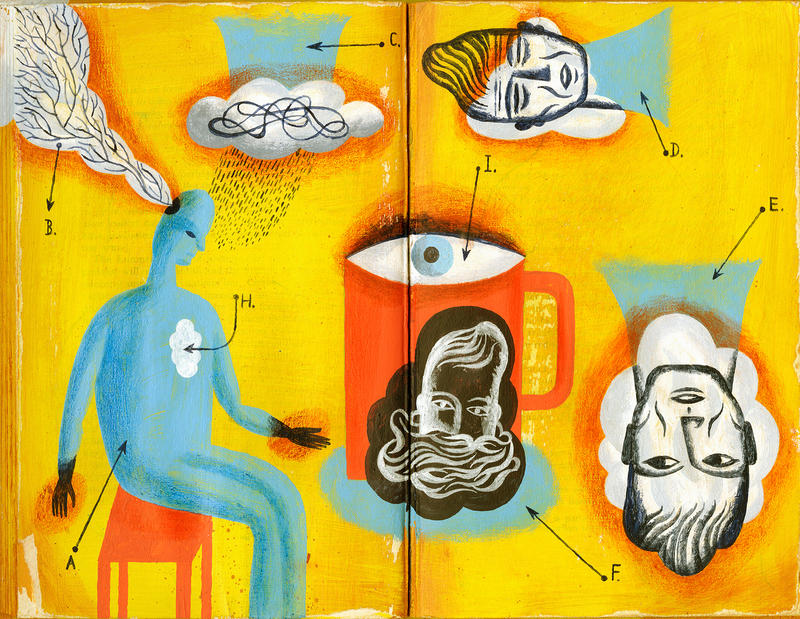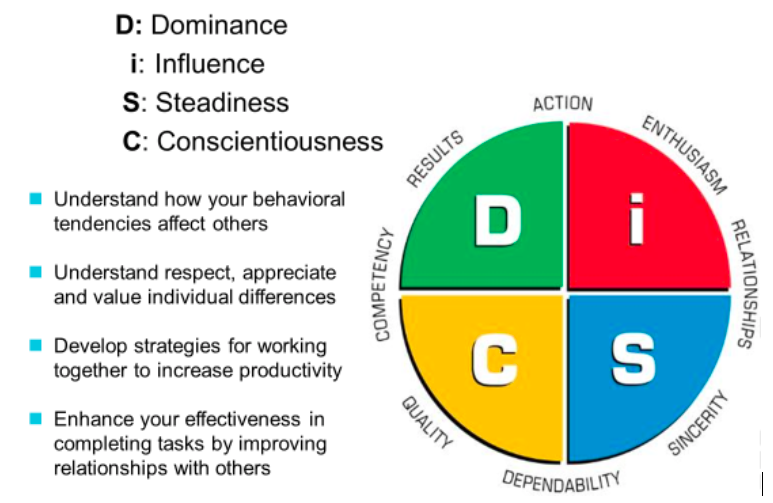Official myers briggs personality types
The Myers & Briggs Foundation
ISTJ
Quiet, serious, earn success by thoroughness and dependability. Practical, matter-of-fact, realistic, and responsible. Decide logically what should be done and work toward it steadily, regardless of distractions. Take pleasure in making everything orderly and organized - their work, their home, their life. Value traditions and loyalty.
ISFJ
Quiet, friendly, responsible, and conscientious. Committed and steady in meeting their obligations. Thorough, painstaking, and accurate. Loyal, considerate, notice and remember specifics about people who are important to them, concerned with how others feel. Strive to create an orderly and harmonious environment at work and at home.
INFJ
Seek meaning and connection in ideas, relationships, and material
possessions. Want to understand what motivates people and are
insightful about others. Conscientious and committed to their
firm values. Develop a clear vision about how best to serve the
common good. Organized and decisive in implementing their vision.
INTJ
Have original minds and great drive for implementing their ideas and achieving their goals. Quickly see patterns in external events and develop long-range explanatory perspectives. When committed, organize a job and carry it through. Skeptical and independent, have high standards of competence and performance - for themselves and others.
ISTP
Tolerant and flexible, quiet observers until a problem appears,
then act quickly to find workable solutions. Analyze what makes
things work and readily get through large amounts of data to isolate
the core of practical problems. Interested in cause and effect,
organize facts using logical principles, value efficiency.
ISFP
Quiet, friendly, sensitive, and kind. Enjoy the present moment, what's going on around them. Like to have their own space and to work within their own time frame. Loyal and committed to their values and to people who are important to them. Dislike disagreements and conflicts, do not force their opinions or values on others.
INFP
Idealistic, loyal to their values and to people who are important to them. Want an external life that is congruent with their values. Curious, quick to see possibilities, can be catalysts for implementing ideas. Seek to understand people and to help them fulfill their potential. Adaptable, flexible, and accepting unless a value is threatened.
INTP
Seek to develop logical explanations for everything that interests
them. Theoretical and abstract, interested more in ideas than
in social interaction.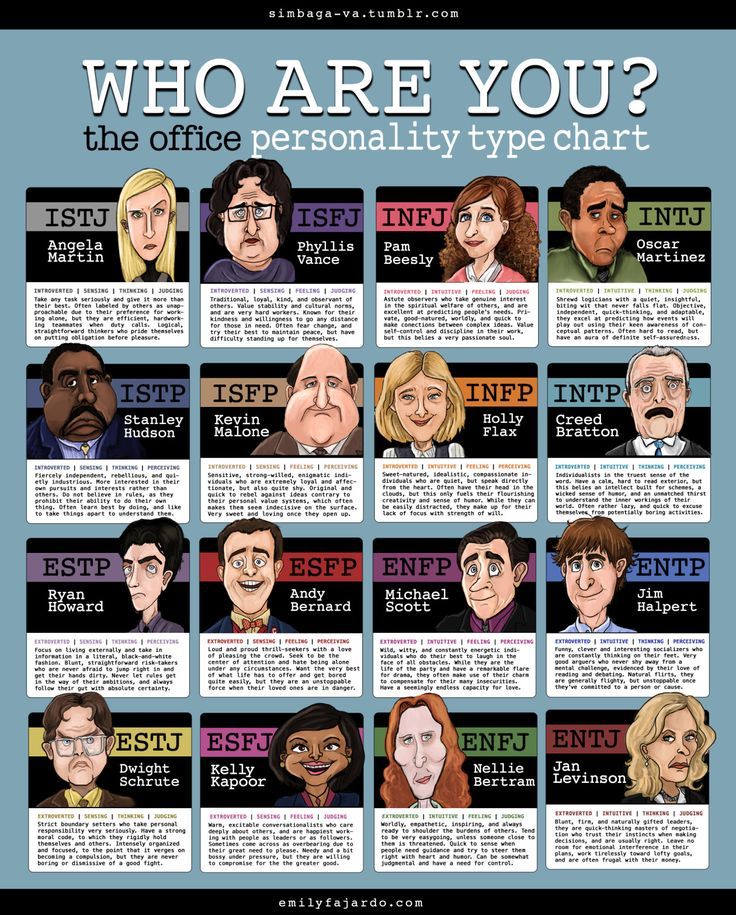 Quiet, contained, flexible, and adaptable.
Have unusual ability to focus in depth to solve problems in their
area of interest. Skeptical, sometimes critical, always analytical.
Quiet, contained, flexible, and adaptable.
Have unusual ability to focus in depth to solve problems in their
area of interest. Skeptical, sometimes critical, always analytical.
ESTP
Flexible and tolerant, they take a pragmatic approach focused on immediate results. Theories and conceptual explanations bore them - they want to act energetically to solve the problem. Focus on the here-and-now, spontaneous, enjoy each moment that they can be active with others. Enjoy material comforts and style. Learn best through doing.
ESFP
Outgoing, friendly, and accepting. Exuberant lovers of life,
people, and material comforts. Enjoy working with others to make
things happen. Bring common sense and a realistic approach to
their work, and make work fun. Flexible and spontaneous, adapt
readily to new people and environments.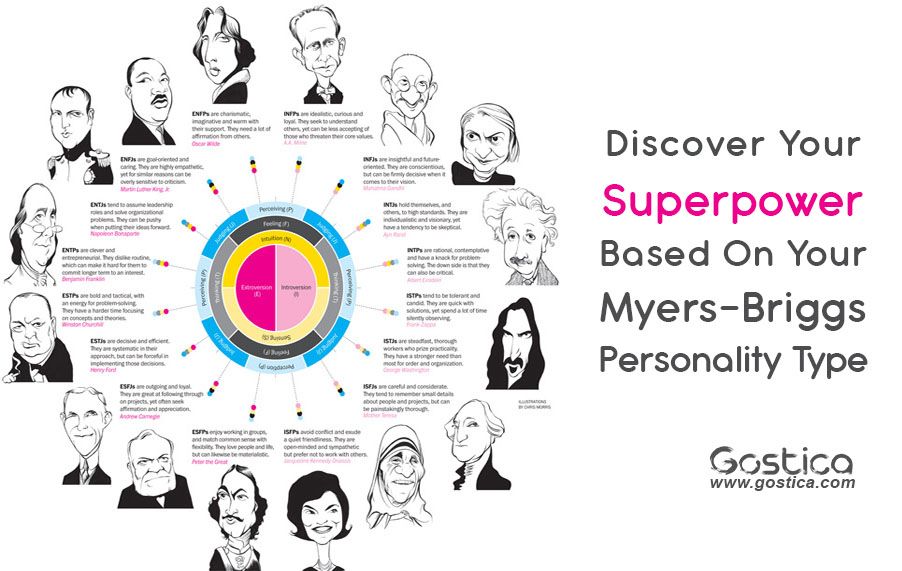 Learn best by trying a
new skill with other people.
Learn best by trying a
new skill with other people.
ENFP
Warmly enthusiastic and imaginative. See life as full of possibilities. Make connections between events and information very quickly, and confidently proceed based on the patterns they see. Want a lot of affirmation from others, and readily give appreciation and support. Spontaneous and flexible, often rely on their ability to improvise and their verbal fluency.
ENTP
Quick, ingenious, stimulating, alert, and outspoken. Resourceful in solving new and challenging problems. Adept at generating conceptual possibilities and then analyzing them strategically. Good at reading other people. Bored by routine, will seldom do the same thing the same way, apt to turn to one new interest after another.
ESTJ
Practical, realistic, matter-of-fact. Decisive, quickly move
to implement decisions.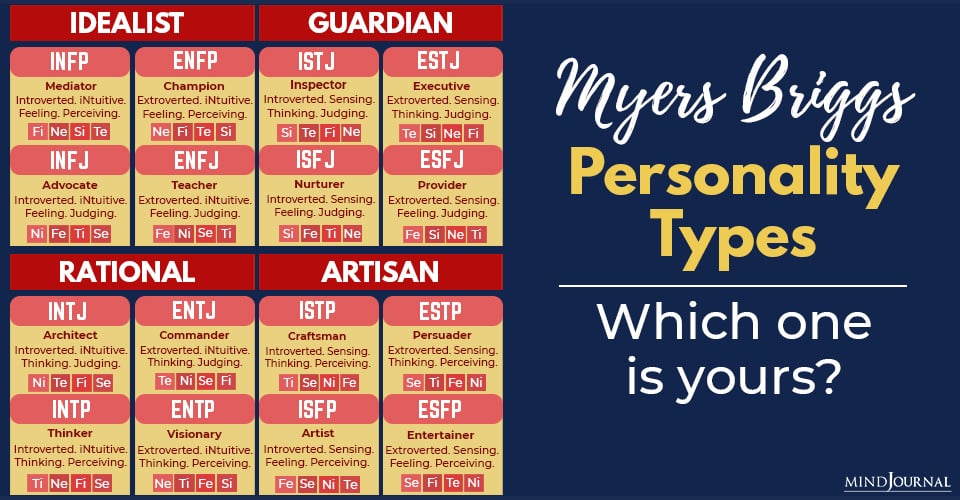 Organize projects and people to get things
done, focus on getting results in the most efficient way possible.
Take care of routine details. Have a clear set of logical standards,
systematically follow them and want others to also. Forceful in
implementing their plans.
Organize projects and people to get things
done, focus on getting results in the most efficient way possible.
Take care of routine details. Have a clear set of logical standards,
systematically follow them and want others to also. Forceful in
implementing their plans.
ESFJ
Warmhearted, conscientious, and cooperative. Want harmony in their environment, work with determination to establish it. Like to work with others to complete tasks accurately and on time. Loyal, follow through even in small matters. Notice what others need in their day-by-day lives and try to provide it. Want to be appreciated for who they are and for what they contribute.
ENFJ
Warm, empathetic, responsive, and responsible. Highly attuned
to the emotions, needs, and motivations of others. Find potential
in everyone, want to help others fulfill their potential.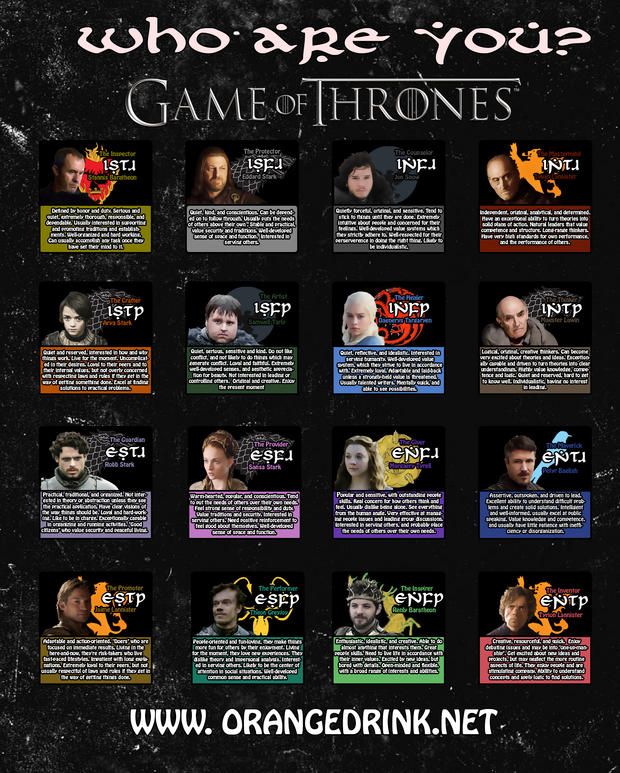 May
act as catalysts for individual and group growth. Loyal, responsive
to praise and criticism. Sociable, facilitate others in a group,
and provide inspiring leadership.
May
act as catalysts for individual and group growth. Loyal, responsive
to praise and criticism. Sociable, facilitate others in a group,
and provide inspiring leadership.
ENTJ
Frank, decisive, assume leadership readily. Quickly see illogical and inefficient procedures and policies, develop and implement comprehensive systems to solve organizational problems. Enjoy long-term planning and goal setting. Usually well informed, well read, enjoy expanding their knowledge and passing it on to others. Forceful in presenting their ideas.
Excerpted from Introduction to Type® by Isabel Briggs Myers published by The Myers-Briggs Company. Used with permission.
Myers & Briggs' 16 Personality Types
Explore our in-depth descriptions of each of the 16 personality types to learn more about yourself and your loved ones. Or, if you're not sure which personality type fits you, take our free personality test .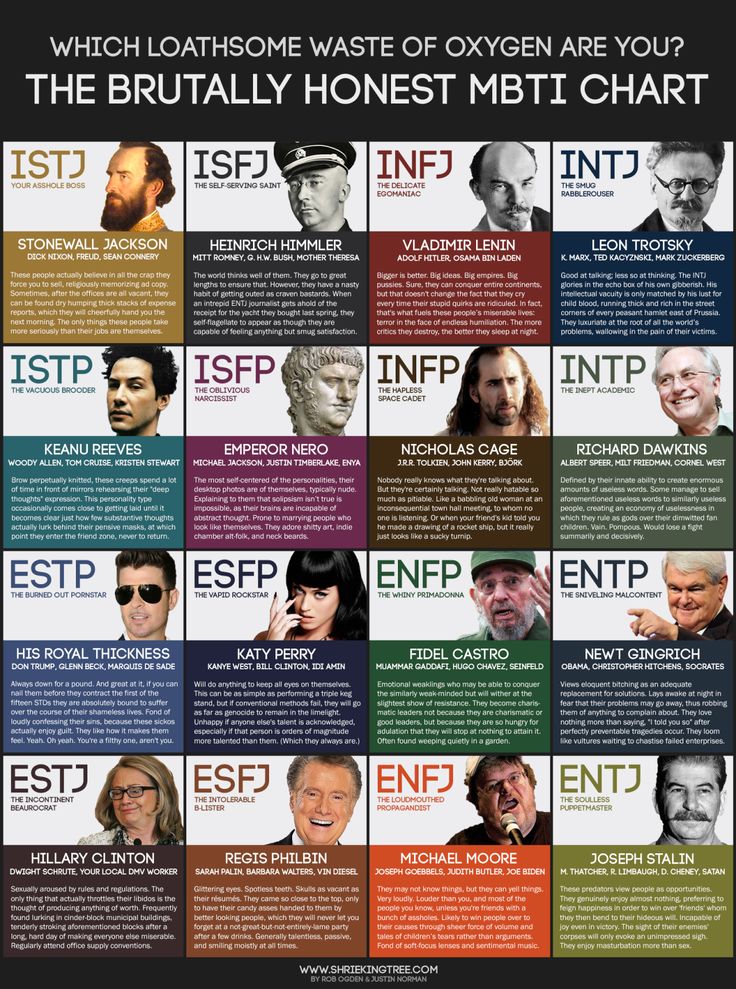
The 16 personality types were created by Isabel Myers and Katharine Briggs, developers of the MBTI® assessment. Myers and Briggs created their personality typology to help people discover their own strengths and gain a better understanding of how people are different.
When you discover your own personality type, you'll understand more clearly why you do the things you do. You will gain confidence in your strengths and be better able to make decisions that suit your true nature.
Find Your Type
INFP
The Healer
INFPs are imaginative idealists, guided by their own core values and beliefs. To a Healer, possibilities are paramount; the reality of the moment is only of passing concern. They see potential for a better future, and pursue truth and meaning with their own flair.
INTJ
The Mastermind
INTJs are analytical problem-solvers, eager to improve systems and processes with their innovative ideas. They have a talent for seeing possibilities for improvement, whether at work, at home, or in themselves.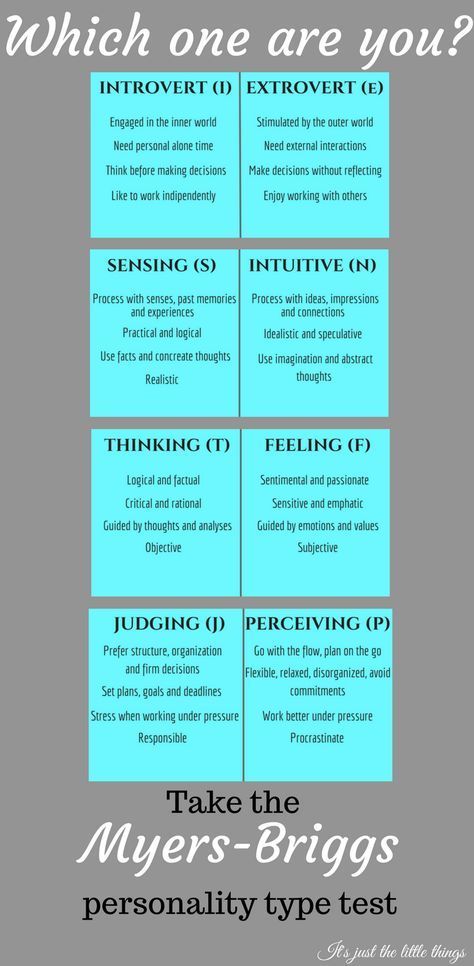
INFJ
The Counselor
INFJs are creative nurturers with a strong sense of personal integrity and a drive to help others realize their potential. Creative and dedicated, they have a talent for helping others with original solutions to their personal challenges.
INTP
The Architect
INTPs are philosophical innovators, fascinated by logical analysis, systems, and design. They are preoccupied with theory, and search for the universal law behind everything they see. They want to understand the unifying themes of life, in all their complexity.
ENFP
The Champion
ENFPs are people-centered creators with a focus on possibilities and a contagious enthusiasm for new ideas, people and activities. Energetic, warm, and passionate, ENFPs love to help other people explore their creative potential.
ENTJ
The Commander
ENTJs are strategic leaders, motivated to organize change. They are quick to see inefficiency and conceptualize new solutions, and enjoy developing long-range plans to accomplish their vision.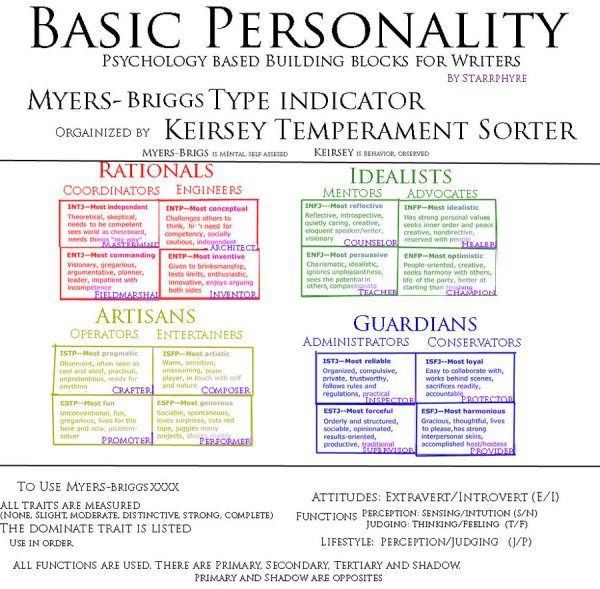 They excel at logical reasoning and are usually articulate and quick-witted.
They excel at logical reasoning and are usually articulate and quick-witted.
ENTP
The Visionary
ENTPs are inspired innovators, motivated to find new solutions to intellectually challenging problems. They are curious and clever, and seek to comprehend the people, systems, and principles that surround them.
ENFJ
The Teacher
ENFJs are idealist organizers, driven to implement their vision of what is best for humanity. They often act as catalysts for human growth because of their ability to see potential in other people and their charisma in persuading others to their ideas.
ISFJ
The Protector
ISFJs are industrious caretakers, loyal to traditions and organizations. They are practical, compassionate, and caring, and are motivated to provide for others and protect them from the perils of life.
ISFP
The Composer
ISFPs are gentle caretakers who live in the present moment and enjoy their surroundings with cheerful, low-key enthusiasm.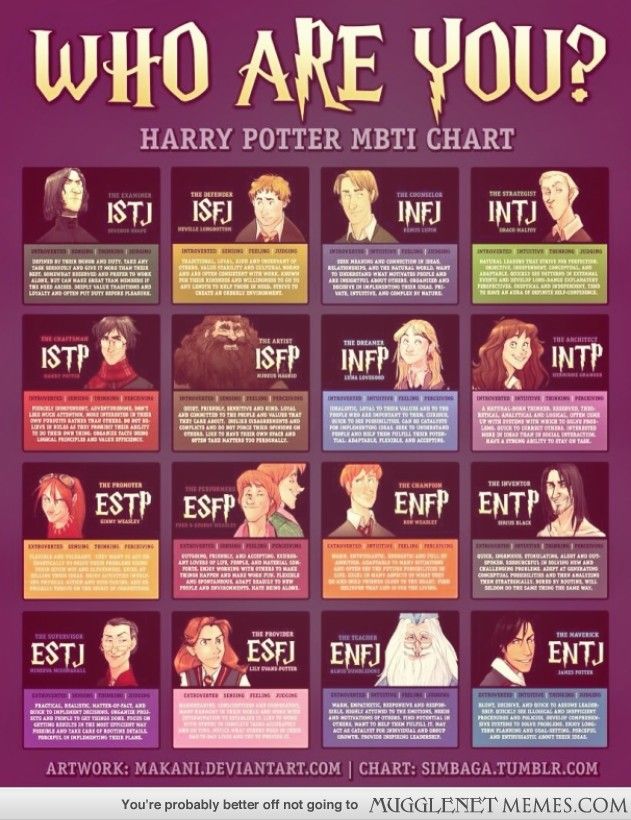 They are flexible and spontaneous, and like to go with the flow to enjoy what life has to offer.
They are flexible and spontaneous, and like to go with the flow to enjoy what life has to offer.
ISTJ
The Inspector
ISTJs are responsible organizers, driven to create and enforce order within systems and institutions. They are neat and orderly, inside and out, and tend to have a procedure for everything they do.
ISTP
The Craftsperson
ISTPs are observant artisans with an understanding of mechanics and an interest in troubleshooting. They approach their environments with a flexible logic, looking for practical solutions to the problems at hand.
ESFJ
The Provider
ESFJs are conscientious helpers, sensitive to the needs of others and energetically dedicated to their responsibilities. They are highly attuned to their emotional environment and attentive to both the feelings of others and the perception others have of them.
ESFP
The Performer
ESFPs are vivacious entertainers who charm and engage those around them.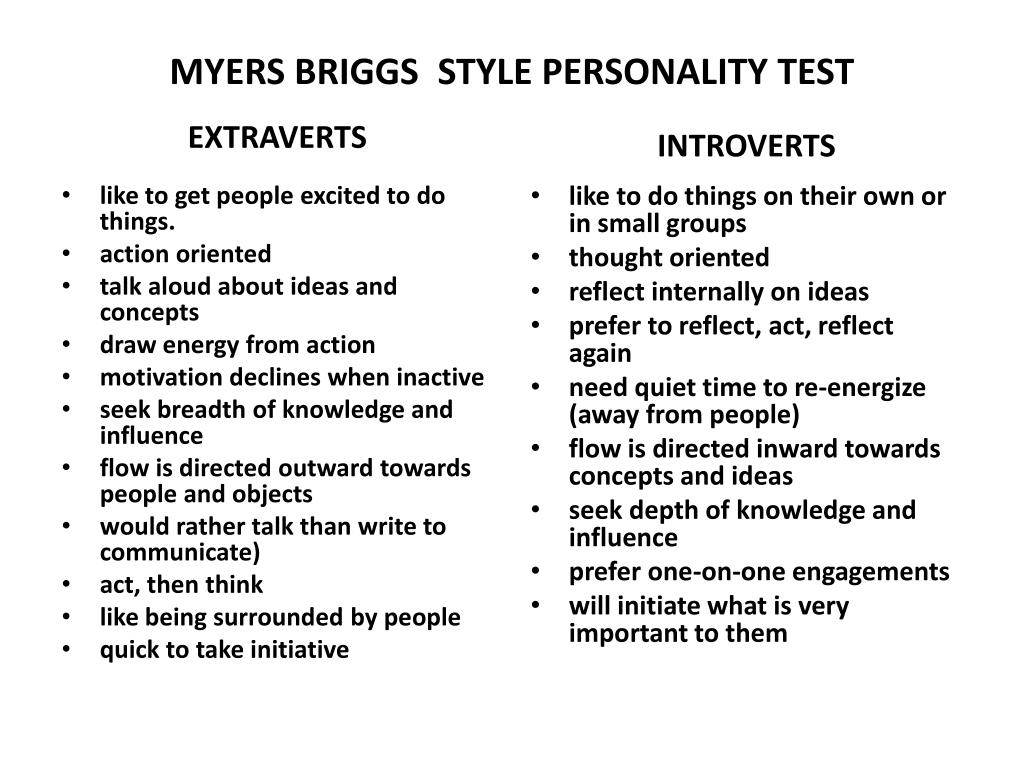 They are spontaneous, energetic, and fun-loving, and take pleasure in the things around them: food, clothes, nature, animals, and especially people.
They are spontaneous, energetic, and fun-loving, and take pleasure in the things around them: food, clothes, nature, animals, and especially people.
ESTJ
The Supervisor
ESTJs are hardworking traditionalists, eager to take charge in organizing projects and people. Orderly, rule-abiding, and conscientious, ESTJs like to get things done, and tend to go about projects in a systematic, methodical way.
ESTP
The Dynamo
ESTPs are energetic thrillseekers who are at their best when putting out fires, whether literal or metaphorical. They bring a sense of dynamic energy to their interactions with others and the world around them.
Personality typing is a system of categorizing people according to their tendencies to think and act in particular ways. Personality typing attempts to find the broadest, most important ways in which people are different, and make sense of these differences by sorting people into meaningful groups.
What is personality typing?
The personality types described here were created by Isabel Briggs Myers and her mother, Katharine Briggs, in the 1960's.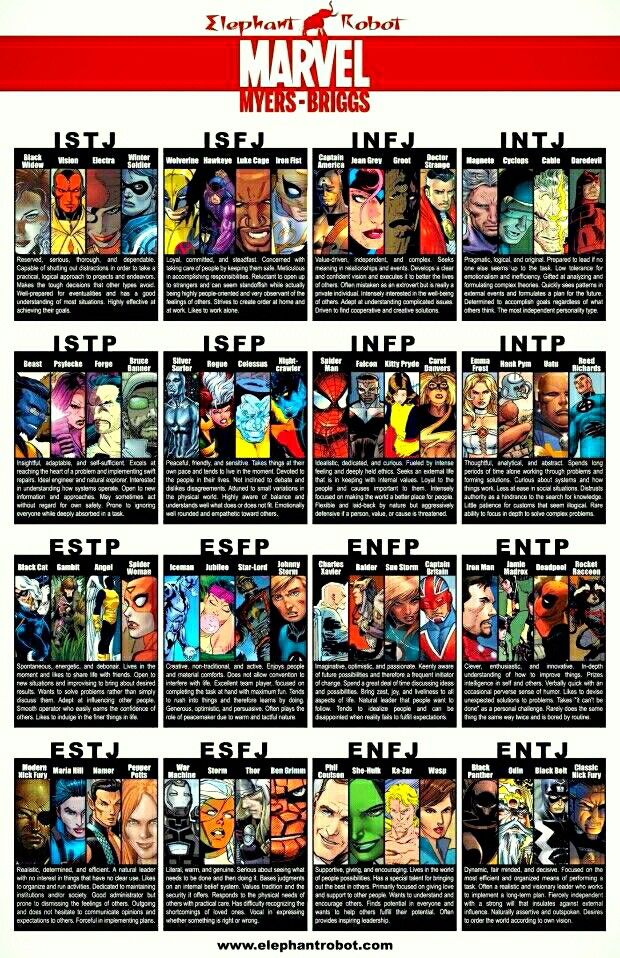 Their theories were based on the work of psychologist Carl Jung, although they extended his ideas to create a more complete framework of personality typing. Myers and Briggs proposed that there were four key dimensions that could be used to categorize people:
Their theories were based on the work of psychologist Carl Jung, although they extended his ideas to create a more complete framework of personality typing. Myers and Briggs proposed that there were four key dimensions that could be used to categorize people:
- Introversion vs. Extraversion
- Sensing vs. Intuition
- Thinking vs. Feeling
- Judging vs. Perceiving
Each of the four dimensions was described as a dichotomy, or an either/or choice between two styles of being. Myers and Briggs described this as a "preference" and proposed that any individual should be able to identify a preferred style on each of the four dimensions. The sum of a person's four preferred styles becomes their personality type.
Myers and Briggs theorized that our preferences on each of the four dimensions would combine to create predictable patterns in thought and behavior, so that people with the same four preferences would share many commonalities in the way they approach their lives, from the hobbies they choose to the work that might suit them.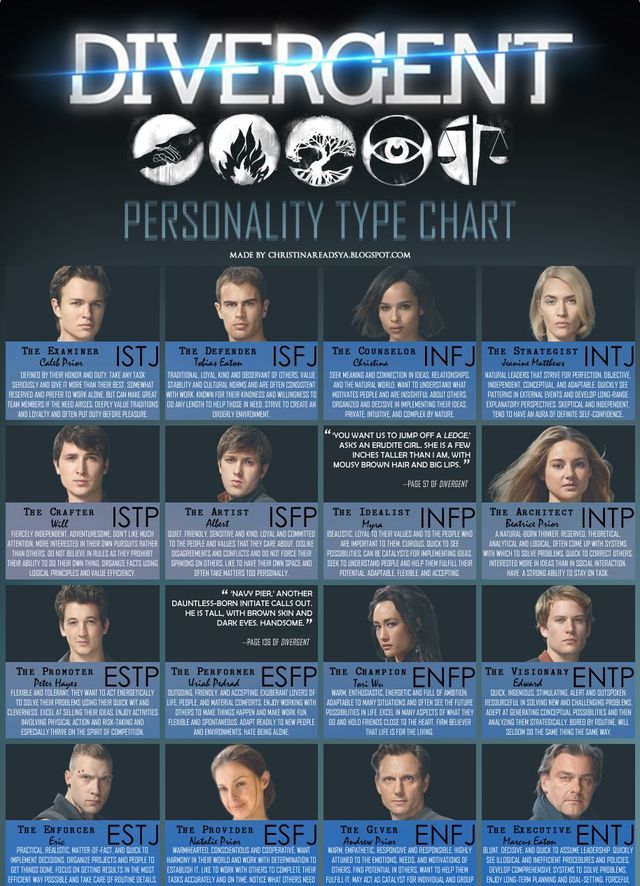
What is the meaning of the four letters in a personality type?
Each of the four letters in a personality type code stands for a preference in your style of thinking or behaving.
I/E: Introversion or Extraversion
The Introversion/Extraversion dimension describes how a person manages their energy.
Introverts are energized by spending quiet time alone or with a small group. They tend to be more reserved and thoughtful.
Extraverts are energized by spending time with people and in busy, active surroundings. They tend to be more expressive and outspoken.
S/N: Sensing or iNtuition
The Sensing/Intuition dimension describes how an individual processes information.
Sensors focus on their five senses and are interested in information they can directly see, hear, feel, and so on. They tend to be hands-on learners and are often described as "practical."
Intuitives focus on a more abstract level of thinking; they are more interested in theories, patterns, and explanations.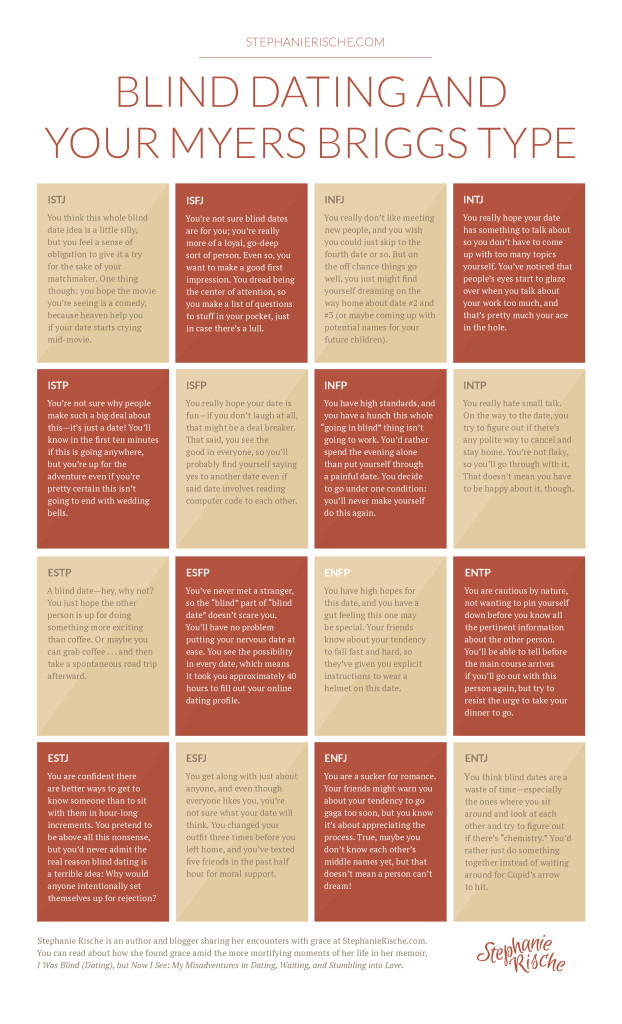 They are often more concerned with the future than the present and are often described as "creative."
They are often more concerned with the future than the present and are often described as "creative."
T/F: Thinking or Feeling
The Thinking/Feeling dimension describes how people make decisions.
Thinkers tend to make decisions with their heads; they are interested in finding the most logical, reasonable choice.
Feelers tend to make decisions with their hearts; they are interested in how a decision will affect people, and whether it fits in with their values.
J/P: Judging or Perceiving
The Judging/Perceiving dimension describes how people approach structure in their lives.
Judgers appreciate structure and order; they like things planned, and dislike last-minute changes.
Perceivers appreciate flexibility and spontaneity; they like to leave things open so they can change their minds.
How do I know which personality type I am?
Easy—take our in-depth personality type test!
THE FINE PRINT: Myers-Briggs® and MBTI® are registered trademarks of the MBTI Trust, Inc.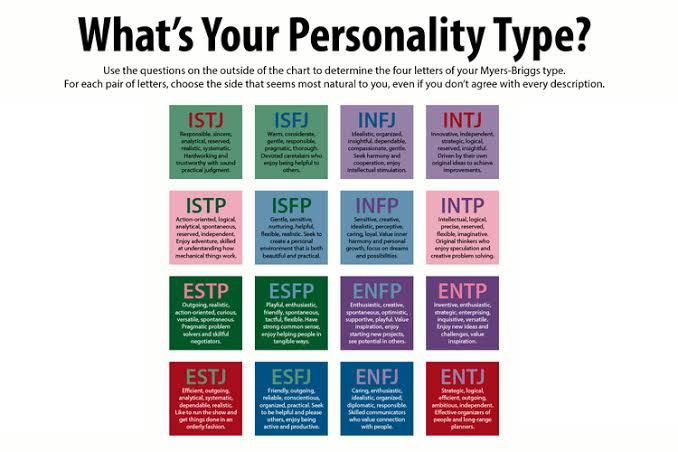 , which has no affiliation with this site. Truity offers a free personality test based on Myers and Briggs' types, but does not offer the official MBTI® assessment. For more information on the Myers Briggs Type Indicator® assessment, please go here.
, which has no affiliation with this site. Truity offers a free personality test based on Myers and Briggs' types, but does not offer the official MBTI® assessment. For more information on the Myers Briggs Type Indicator® assessment, please go here.
Personality types | 16Personalities
Analysts
Strategist
INTJ-A / INTJ-T
Imaginative, strategic thinkers with a plan for all occasions.
Scientist
INTP-A / INTP-T
Creative inventors, with a strong belief in the power of knowledge.
Commander
ENTJ-A / ENTJ-T
Brave, resourceful and strong-willed leaders who always find a way - or make a way.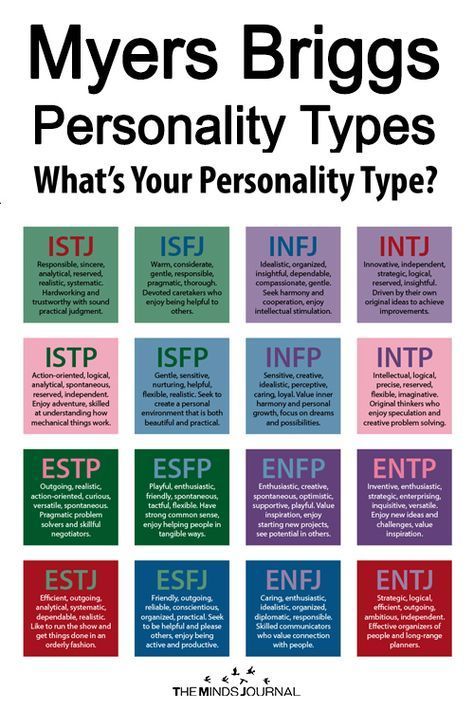
Debater
ENTP-A / ENTP-T
Smart and curious thinkers who never turn down an intellectual challenge.
Diplomats
Activist
INFJ-A / INFJ-T
Quiet and mystical, but inspiring and relentless idealists.
Broker
INFP-A / INFP-T
Poetic, kind and altruistic personalities, always ready to stand up for a good cause.
Trainer
ENFJ-A / ENFJ-T
Charismatic and inspiring leaders who captivate their listeners.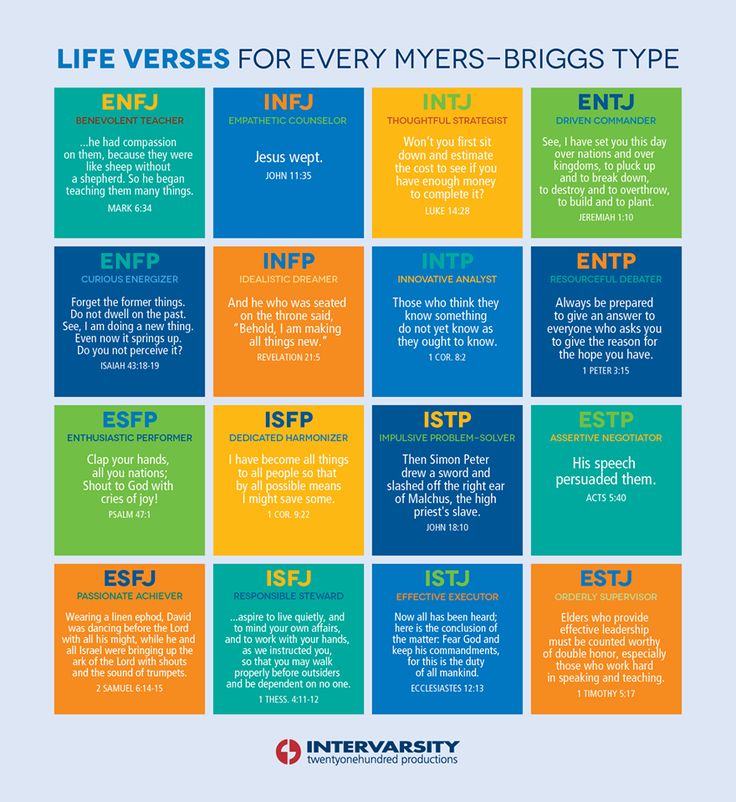
Wrestler
ENFP-A / ENFP-T
Enthusiasts, creative and sociable free minds who always find a reason to smile.
Guardians
Administrator
ISTJ-A / ISTJ-T
Practical and factual people whose reliability is unshakable.
Protector
ISFJ-A / ISFJ-T
Very responsible and kind protectors, always ready to protect their loved ones.
Manager
ESTJ-A / ESTJ-T
Excellent administrators, unsurpassed specialists in process and people management.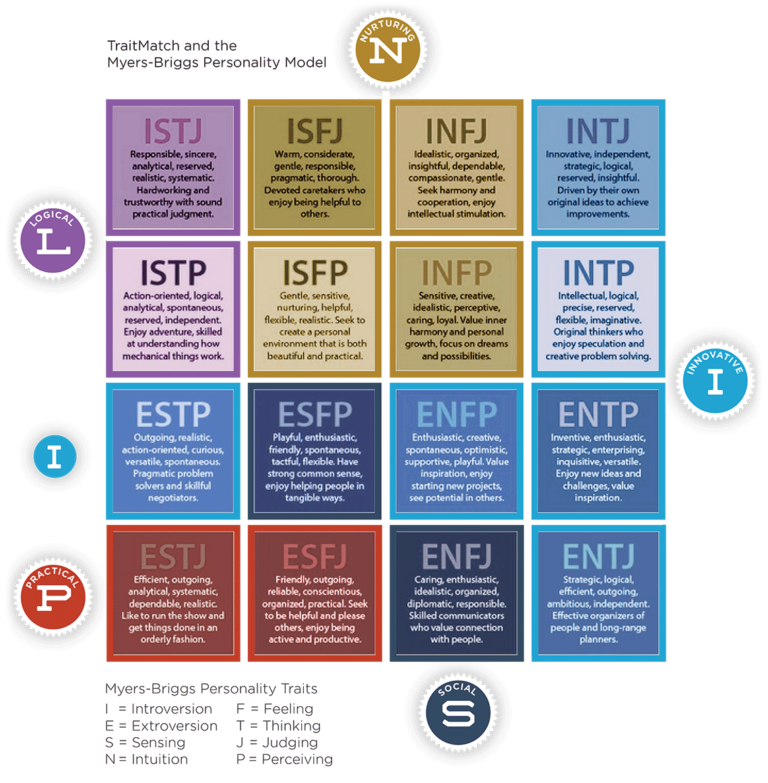
Consul
ESFJ-A / ESFJ-T
Extremely caring, sociable and popular people, always ready to help.
Seekers
Virtuoso
ISTP-A / ISTP-T
Brave and practical experimenters, masters of all kinds of techniques and tools.
Artist
ISFP-A / ISFP-T
Flexible and charming artists, always ready to explore and experience something new.
Dealer
ESTP-A / ESTP-T
Smart, energetic and very receptive people who truly enjoy risk.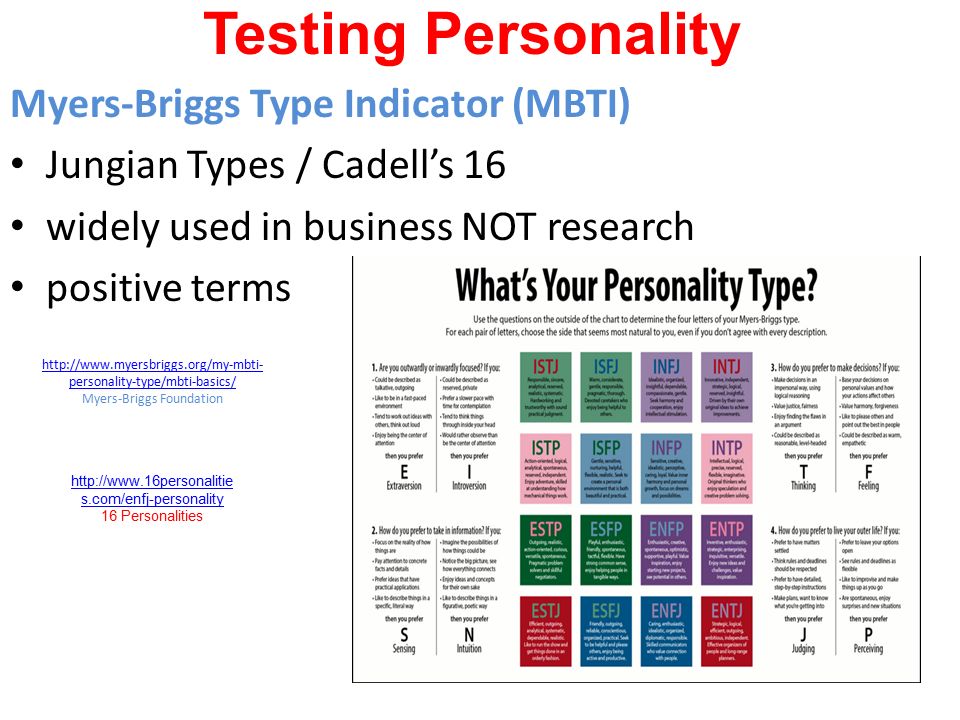
Entertainer
ESFP-A / ESFP-T
Spontaneous, energetic and tireless merry fellows - where they are, it's never boring.
MBTI® - Myers-Briggs Type Indicator from The Myers-Briggs Company
Foundation for continuous personal development
By identifying your personality type, the MBTI ® (Myers-Briggs Type Indicator) tool lays a solid foundation for continuous personal development. The tool offers a constructive, flexible and empowering model for understanding individual differences and strengths.
What is a Myers-Briggs Type Indicator (MBTI)?
MBTI Tool: Personality Type Identification
The MBTI is the best known and most reliable personal assessment tool and The Myers-Briggs Company is its exclusive distributor in Europe.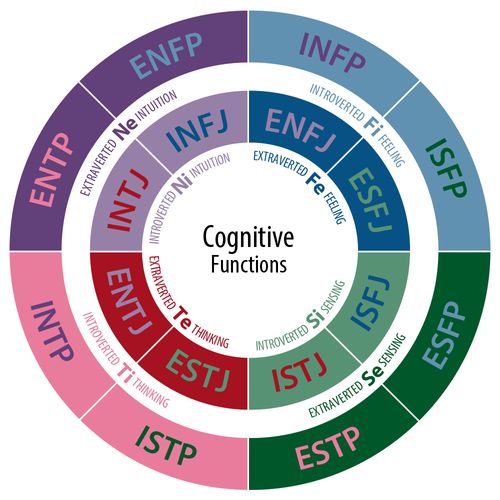 Much more than just a series of personality assessments, the MBTI Step I and Step II tools provide a constructive and fluid model applicable to all areas of human relationships and personal development. The MBTI profile reveals how we see and interact with the world around us and reveals unique insights into what motivates us and others. This is a solid foundation for personal growth and development and personal effectiveness.
Much more than just a series of personality assessments, the MBTI Step I and Step II tools provide a constructive and fluid model applicable to all areas of human relationships and personal development. The MBTI profile reveals how we see and interact with the world around us and reveals unique insights into what motivates us and others. This is a solid foundation for personal growth and development and personal effectiveness.
- MBTI Step I defines a personality type made up of four basic characteristics and also presents a positive system that explains how we interact with the world and others
- MBTI Step II takes a closer look at the characteristics identified in the Step I process, revealing how each personality type finds its unique expression
Based on the MBTI typology, the MBTI model promotes large-scale and continuous development, including solving many common problems in the workplace and beyond.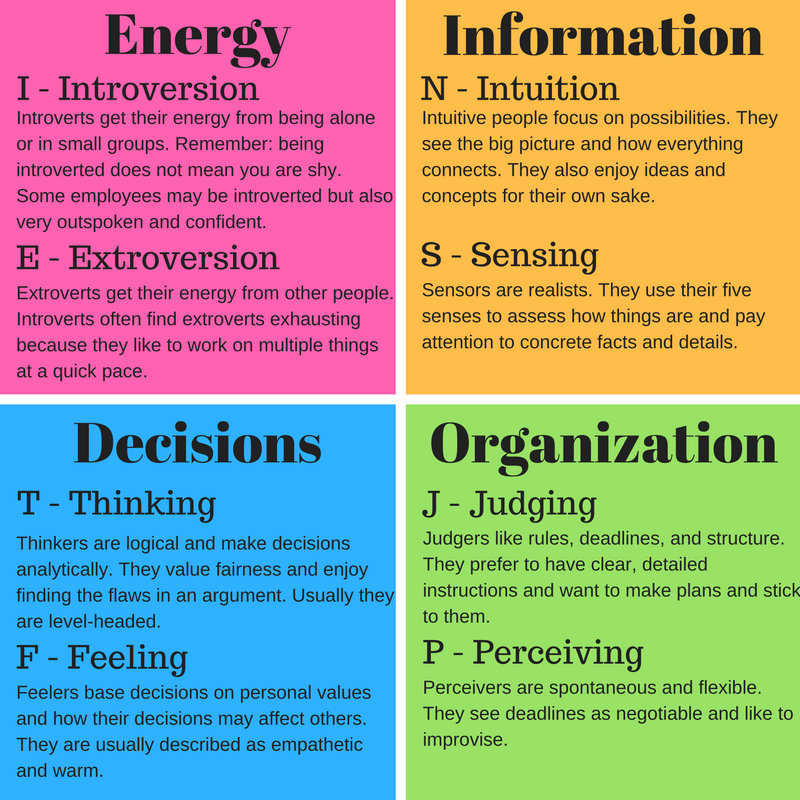
Applications
- Coaching
- Communication and influence
- Conflict management
- Decision making
- Leadership development
- Change management
- Increasing stress tolerance
- Team Development
- Career development
- Career guidance
The Myers-Briggs Company: Exclusive European Supplier of Genuine MBTI*
The Myers-Briggs Company is the official European distributor of MBTI tools and related products. This means that when you purchase a product from The Myers-Briggs Company, you are getting an authentic instrument designed by Isabelle Myers and Katharina Briggs and backed by over 70 years of rigorous research. There are many free personality scoring systems out there, and some of them even offer a four-letter score that looks just like the MBTI data.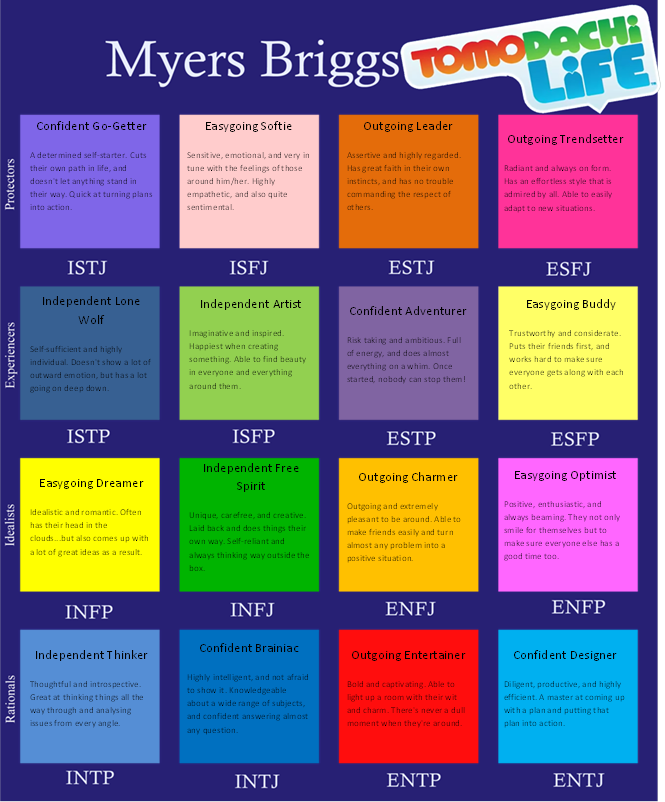


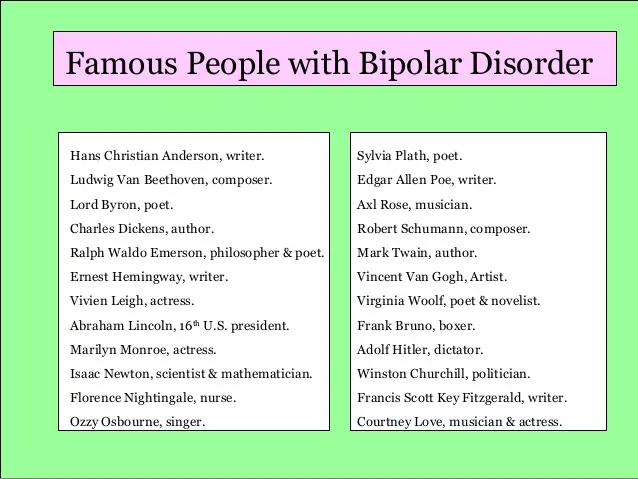



.bmp)

